Senate Kills
Buffet Rule
When
will the majority population of the U.S. finally rise up and
take control?
By RAR
Sen.
Jon Kyl's math-based logic in countering the measure:
"You've got the top 10 percent of
taxpayers paying 70 percent of all the taxes, earning 45 percent of the income.
Those are certainly the wealthy, and they're certainly paying a big share... How
about less wealthy? The bottom 95 percent -- in other words, everybody but the
top 5 percent -- pays 41.3 percent of income taxes, earns 65 percent of the
money, of the income. Is this fair?"
The
correct answer would be that Kyl has provided inadequate information to make
such a subjective judgment. One would need to include an apriori
___________________

 
_____________________
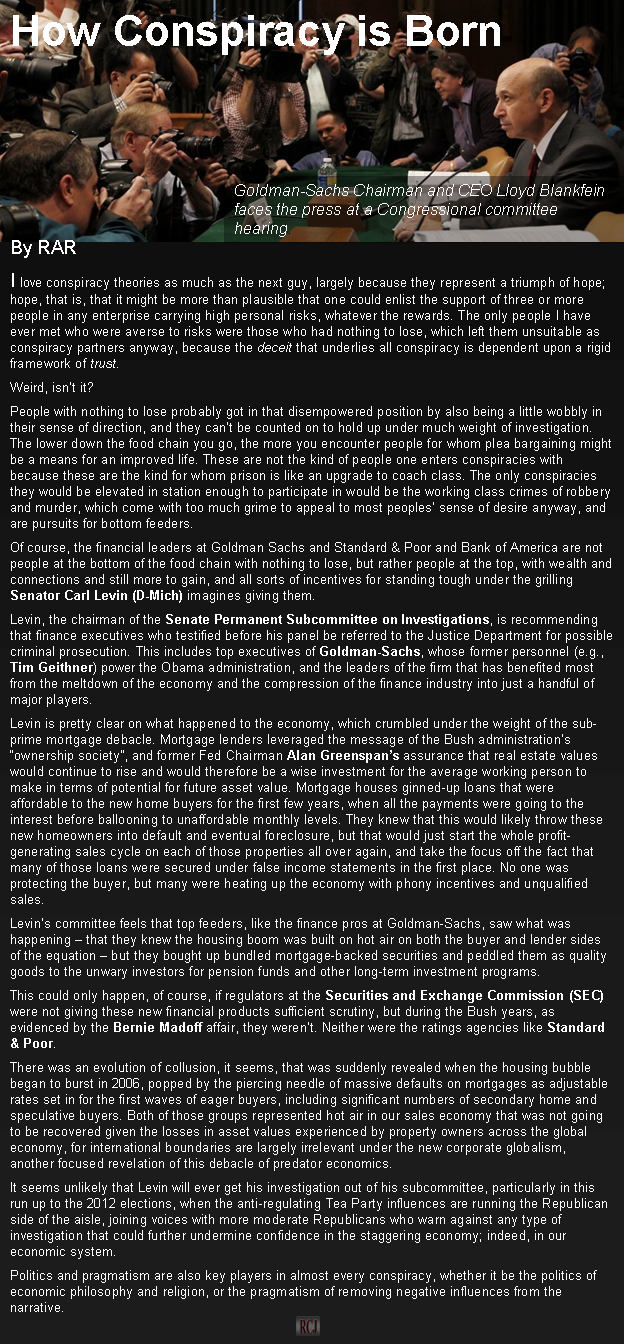
___________________
.png)
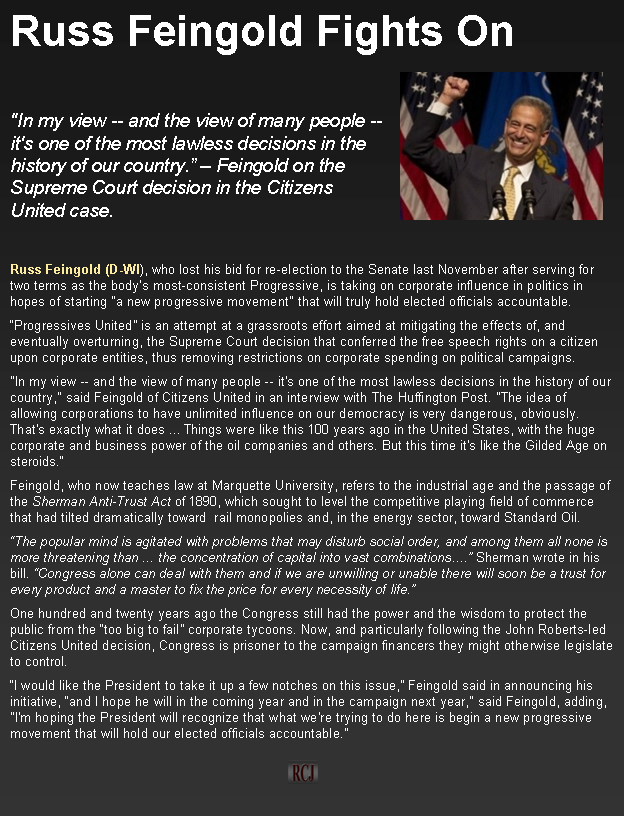
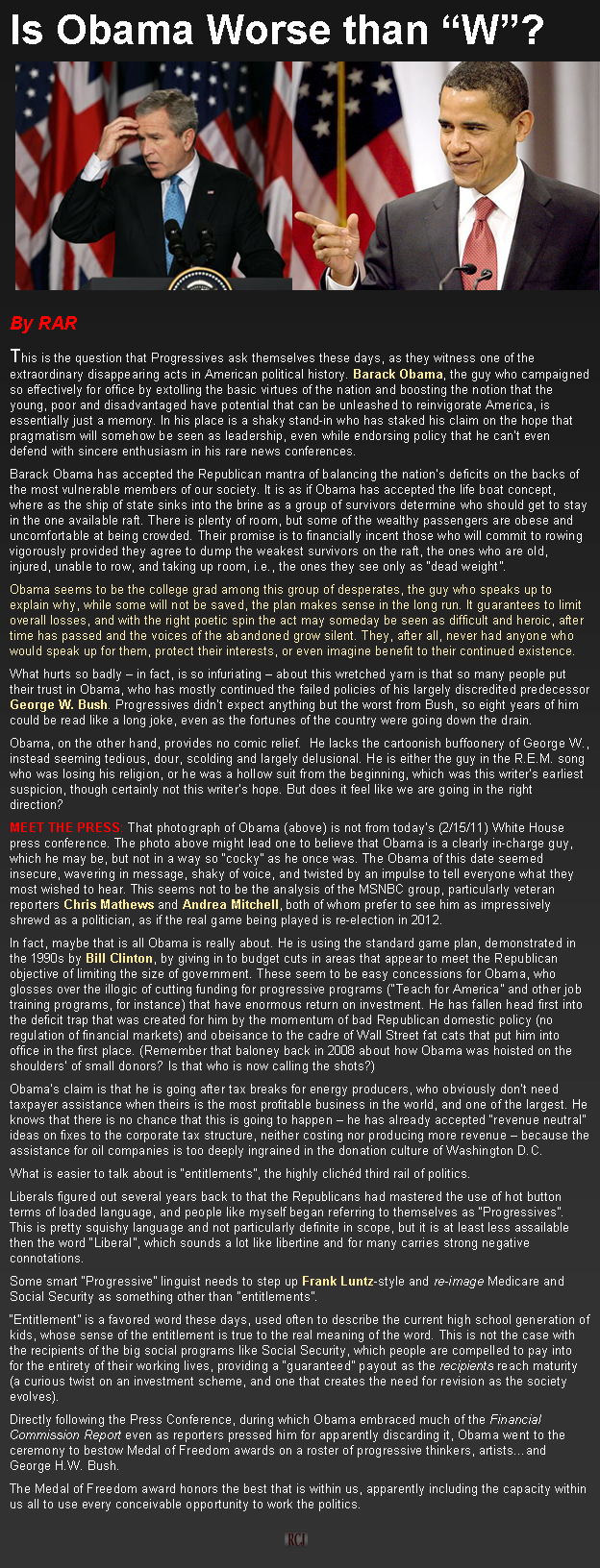
PUBLISHED PREVIOUSLY AT WWW.RARWRITER.COM
___________________

______________

___________________________________________
Posted
June 2, 2010

_____________________________
Posted September 30, 2009
BIZARRE ARGUMENTS FILE
Just occasionally, here in the Bizarro
World, one will hear someone stake out a position with an argument
so bizarre that it just calls out for special recognition. Here at
RARWRITER.com, we will honor these strange testimonies to human
ingenuity-in-denial by adding them to the "Bizarre Arguments File".
We Can't Tamper With
Health Care Because It Is One-Sixth of Our Economy
That health care is one-sixth of our
economy is exactly the reason we should tamper with health
care. It shouldn't be more than 10 percent of our economy (against
Gross Domestic Product), as it is in every other country in the
world (except East Timor), but it is 16 percent in the U.S. and
growing at a rate 4 times that of our ability to pay for it.
Ben Stein Says Save,
But Not Too Much
The curmudgeon actor-economist and
Republican activist Ben Stein was on CNN recently talking about the
importance of buying stuff you want, rather than investing for a
rainy day. He told about spending $15,000 many years ago on a boat,
when he could have purchased stock in Berkshire-Hathaway that today
is valued at over $100,000. Stein says he has gotten so much
pleasure out of that boat that he would spend his money that same
way again "in a heartbeat". This probably explains why Stein is more
actor than economist: he didn't bet that he'd live to a future date,
when he could have had that boat plus another $85K.
The Second Amendment
Guarantees the Right of U.S. Citizens to Bear Arms
The founding fathers of the United
States were so smart, they crafted language for the Second Amendment
to the Constitution that is so staggeringly awful that 230 years
later its meaning is still interpreted in accordance with every
reader's personal politics. In 2008 a 5-to-4 vote in the Supreme
Court - right along party lines in a court that was imagined, by
those same founding fathers mentioned earlier (the ones who couldn't
write a simple, declarative sentence) - determined that Americans
have a right to own guns for self-defense and hunting, based on that
baffling Second Amendment language. The Second Amendment was crafted
at a time when less than 1 percent of the 4 million or so people
living in the U.S. actually owned a weapon. The French imported
weapons to the U.S. so the Revolutionary warriors would have muskets
to fight the British with, but by 1806 there were still only 370,000
"guns" in the country. Washington's army had a hard time arming new
enlistments because when departing soldiers returned to their homes
they typically took their government-issued weapons with them.
Switzerland Was
Spared Nazi Occupation in WWII Because the Swiss Were Armed
Hitler's Nazi Army rolled over Europe in
the late 1930s like a tsunami, whole nations falling before their
might within days or weeks of the arrival of their Blitzkreig. Not
Switzerland, though. Pro-gun advocates love to point out that the
Nazi's feared the mountainous terrain and the fact that every Swiss
household owned a rifle. Supposedly some German strategist described
the Swiss defense plan as simply "fire two shots and go home",
anticipating such a hail of bullets coming down on Nazi forces,
trapped among the rocks and the trees amid all of these heavily
armed Swiss, that it would be fool-hardy to attempt to take the
country. On another front, they apparently had no similar concerns
regarding the Russian army.
______________________________
Posted September 16, 2009
The Racism "Non-Starter"
It is hardly
surprising, with Barack Obama in the White House, that the word "racism" is
uttered frequently these days. It is one of the most popular of condemnations in
any season, but the election of the nation's "first Black president" just makes
it a natural now in everyday conversation. While Obama was running for the
office, Obama supporters tended to brand anyone who asked tough questions about
their candidate as "racist", which I think is in part responsible for why the
national media handled Obama the candidate with kid gloves. On the other hand,
former President Jimmy Carter sees racism in the anti-Obama rhetoric
accompanying the health care debate, and still others, like Rush Limbaugh,
believes that Obama is himself a racist.
This largely valueless word's universal facility
for putting people of every color on the defensive is almost without equal.
(There may be equally powerful and dexterous words, but they don't race
to mind.). The visceral source of its power must lie among the nexus of concepts
like fear and guilt, but Merriam-Webster Dictionary provides this literal
guidance on the word:
Main Entry: rac·ism
Pronunciation: \ˈrā-ˌsi-zəm also -ˌshi-\
Function: noun
Date: 1933
1 : a belief that race is the primary determinant of human
traits and capacities and that racial differences produce an inherent
superiority of a particular race
2 : racial prejudice or discrimination
— rac·ist \-sist also -shist\
noun or adjective
I think that is an obsolete definition, but we
are weighted by "recent" history. Its derivation goes back to related, but
now "biologically extinct", words like "racialism". The word "racism" became
common in the 1930s as a favorite concept in Nazi literature and in their ideas
about Saxon superiority. As we still have people living among us who experienced
the wrath of Nazi racial intolerance, that word still carries the stink of what
such thinking wrought.
On the other hand, it's a Black thing. In the
U.S., when we think of "racists" we think of white supremacists subjugating
Blacks, unless you are Rush Limbaugh and feel the pain of being discriminated
against by Blacks. Latinos feel racially discriminated against, and I
have heard Filipinos speak openly about it, as in "Is he a racist?"
My guess is that one's "respect" for the word is
like a Voodoo thing, that if you believe in Voodoo it works, and if you believe
you are subject to racial discrimination, that too works. Your capacity to
withstand such a destructive force is no doubt tied to the extent to which you
are subjugated in your daily life. As a White guy, I feel the unreasoned
discriminations of other people, but it doesn't have much impact. Were I of
another color I would no doubt feel differently, though I will never know
exactly what that might mean. One cannot avoid one's own race.
I don't think it matters.
I think people, as a whole, are largely past
interacting with other people based on considerations of their races. Cultural
tendencies aside, along with a natural human tendency to mimic the communication
patterns of others, I think what people respond to in others is the quality of
their interaction. That has nothing to do with race. If an interaction with
another person is pleasant, rational, logical, friendly and supportive, or
almost any one of those, nobody has any problems with anyone, regardless of
color.
What people hate is "stupid people" who display
none of those qualities, i.e., people who are unpleasant, irrational, illogical,
unfriendly and unsupportive. There is no color a person can have that can
somehow overcome any of those behaviors or characteristics. Or, conversely, no
color that can justify same.
Getting rid of this "Nazi word", used way too
frequently and never to any positive effect, wouldn't get rid of people who feel
inherently superior. On the other hand, we should all self monitor its use out
of existence, because presently it is empowered so as to be an immediate
non-starter, a charge that renders all subsequent conversation unlikely.-
RAR
________________________________
From March 1, 2009
And What
Is "Knowing"?
How Do You Know?
That is what the
banks and financial institutions are saying to critics of the
bailouts, who doubt that the money is doing any good. "How do you
know," they ask, "that things wouldn't now be much worse had we not
have had those packages?"
How do we know?
Usually we know only
what we are shown and what we are told, but in this new stimulation
age big bail-out beneficiaries like the American Insurance Group
(AIG) aren't telling us where the taxpayer-provided funding they
have received thus far has gone. It has been disbursed among
"counterparties" who have benefited from triggers in AIG's contracts
that guarantee cash collateral if the value of AIG shares fall to
lower than certain threshold levels. And who are these
"counterparties"? AIG won't divulge this, to the government they
have accepted $180 Billion from, because they need to protect their
"confidential transactions."
The government
accepts this baloney because there are all kinds of things it
prefers never to divulge, usually using equally vague "national
security" arguments, and besides, with AIG there is the Trade
Secrets Act, which gives cover to confidential transactions.
It sort of makes you
wonder what the order of things is, doesn't it? What is the "chain
of command"?
In fact,
Bill Moyers Journal
recently did a show that explored whether or not the government has
any power over the financial community, and who is actually in
charge of whom. It appears that big business has simply taken over
the country, using government institutions as mere support
functions. But, we just don't know and can only speculate.
We aren't sure
that we are gaining ground on this current economic miasma.
Barack Obama
tells us we are in the worst economic crisis since the
Great Depression
of the 1930s, and that the
only way to stem the flow of red ink is to spend borrowed money,
first by propping up the banks. But yesterday several banks started
returning the stimulus money saying they don't need it and they
don't want the government to be making decisions along with them,
which they say renders every business decision a "political" one.
The Obama administration is supposedly preparing a new round of
stimulus, but House Leader
Nancy Pelosi and Senate
Leader Harry Reid,
both of Obama's party, are saying there will be no more stimulus
programs, at least not as it appears now.
This trend of
"not knowing" things really took hold with the
G.W. Bush administration,
and its bizarre calculation that the
9-11
attacks could be used to justify an invasion of
Iraq,
even though it would mean phonying up some additional
justifications, like Iraq's weapons of mass destruction, which
turned out not to exist. We aren't sure now if we are winning the
war in Iraq, and though we have a plan for extricating troops, we
have experts who imagine us having a major presence in Iraq in 2025.
We are pretty certain we are not winning in
Afghanistan
- no invading army ever has - but we are sending more troops there,
though we doubt that it will be enough. One military report that
came out this week suggests that it could take as many as 600,000
troops on the ground to secure Afghanistan, but then the war has
already bled over into Pakistan, so who knows what that means?
We aren't sure
about the
Pakistan
government, who has just ceded the
Swat Valley
to the Taliban.
We aren't sure what would happen if the Pakistani government were to
fail, or what the effects of a power struggle in that nuclear-armed
nation, hostile to neighboring
India,
might mean.
We don't know
how stable
North Korea
is, amid rumors of a power struggle in that desperate country as the
health of the dubious Kim
Jong-Il comes under doubt.
Closer to home,
we don't know that
Mexico
isn't about to become a failed state, plowed under by powerful drug
cartels that some reports say have driven the government to the
brink of collapse. In fact, we don't know that we shouldn't be
positioning our distracted military on our southern borders, rather
than halfway around the globe in Asia Minor.
Barack Obama promised
to bring change to Washington D.C., but so far he appears only to
have staffed his administration with people from "the old
Washington", particularly from the Clinton years. It is unclear what
that means. Obama promised to watch the budgets coming out of
Congress to cut unnecessary spending, but in passing the biggest
budget in the history of the world, he declined a watchdog role
saying this budget is "last year's business" and that in the future
things will be done differently. But how do we know?
How do we know that
the stimulus money will have any effect before the economy rebounds
and renders parts of the $2 Trillion budget "unnecessary spending"?
How do we know that
ear marks don't produce stimulative effects?
Berkshire
Hathaway, under the
direction of the "Oracle of Omaha",
Warren Buffet,
lost 62 percent of its value in the last year. The Oracle apparently
just didn't know that some of what they were doing with their
portfolios would turn out to be wrong. On
CNBC
and the Comedy Channel
- now there is a pairing for our times - financial advisor
Jim Cramer
is feuding with The Daily
Show host/comedian
Jon Stewart,
who called him on his advice to buy
Bear Stearns
just weeks before the company collapsed. Cramer didn't know what was
going to happen, he just offered advice.
We all grew up, I
think, with this sense that the world, or at least the U.S. part of
it, would always be fine because it was run by mature, educated
adults who had a handle on complexities the rest of us lacked the
educational backgrounds to fathom, but it didn't matter because
certain people at the top knew what they were doing. That
optimistic, youthful sense of reality fades in all people as they
gain age and experience, and it is probably why people tend to
become more conservative and more "Republican" as they get older. I
don't know that we ever thought the day would come when we would
simply not know what to do with ourselves and our institutions, or
even what is real and really going on.
But, that day has
come.
We have been swept
along by technological change until our world has become complex
beyond the capacities of mere human comprehension. (In some
quarters, this is known as having reached "Singularity". Our
machines have taken over and who knows what will happen next?). We
surrendered years ago to some notion that people in power were there
because they were smarter than us and the best we could do was trust
that they knew what they were doing. We could enjoy the benefits of
their wheelings and dealings, which brought us improvements in
production techniques and business models, and big box stores like
Walmart and low prices on consumer items, and electronic gadgets
that expanded the neural numbness that had first set in with the
television age. As wages stagnated for working people (beginning in
the early '70s) "we the people" - the uneducated, or those of us
educated only to the liberal arts, as became the trend at
universities in that period - got stupider and stupider. And
while that was happening the smart guys on Wall Street got more and
more devious in their deceptions. They got the Glass-Steagall Act
overturned, which threw the doors of financial institutions wide
open to creative corruption, and they ultimately worked in collusion
to create financial products so convoluted that other business
analysts could only speculate as to how they must work.
Did they work? Who
knows?
Who knows how
"bad" things are?
General Motors
was on the brink of bankruptcy last week, and this week offered that
they don't need the bail-out money that had been promised to keep
them afloat for just a while longer. There are Republican states in
the south that are declining Obama's stimulus monies out of
philosophical choice. Don't they need the money when things are as
dire as the Obama administration assures us they are? I mean, these
are southern states, always poor and always in need of help! Now
during the worst economic crisis since the Great Depression they are
able to say "No thanks"? Does that make sense? We just don't know?
Where has all
the money gone? How about all those billions of dollars
Bernie Madoff
bilked people out of? Where is it?
There was a part of
me that suspected that Bush's initial bailout - the Paulson Plan
- was really just the Bushies looting the treasury on their way out
of town. I'm still not sure that isn't what is happening, except now
the Democrats in control of Congress are grabbing the same
opportunity to fund programs they have wanted to fund for years but
could not previously get support to do. And Obama, the most highly
compromised candidate of the Wall Street cabal in U.S. history, just
keeps talking and talking, playing the role he assumed years ago, as
a really young dude, narcissistic enough to be able to keep
repeating what lands on my ears as nauseating bullshit.
But who knows?
Obama and Geithner and Summers and Orszag and Romer may be on to
something. I wonder what it will be?
- RAR
Would That Be Proper?
Economics writer
Robert Kaiser believes he knows, somewhat precisely, when it
happened: when our elected leaders, at the national level, sold
"America" to the big campaign donors. Kaiser was on Moyer's PBS show
on February 20, 2009, and identified 1982 as the "crossover" year. I
sense it happened far earlier than that, probably around the time
the Romans established their Senate, when moneyed interests began
shoveling cash into the pockets of political leaders. That all took
place behind the scenes, however, residing in the realm of things we
suspected were happening but didn't know about for certain. The
change that Kaiser refers to is the moment that politicians and
their advisors decided that there was no staying on the down low any
longer, because the need was for money to buy that most public of
all things, campaign advertising. The "corruption" of the system was
going Prime Time, putting the onus on spin-meisters and talking
heads to sell a blanket of obfuscating fog so the public wouldn't
find it that easy to understand what was happening. To Kaiser, it
all began with the final corruption of the already spiritually
corrupted Senator John Stennis (D-Miss). Here is how Kaiser
described it to Moyers, from the transcript of the February 28
Bill Moyers' Journal:
ROBERT KAISER:
The falling away of taboos, the changing standards in
Washington. The "everybody does it" syndrome, which has taken
control there. I think has made moral judgments really difficult
in our nation's capital. People shy away from saying, "That's
just wrong." There's a wonderful story here from John Stennis.
It's a real signal of what was happening. It's from the '80s,
'82. John Stennis is running for the seventh term in the Senate.
He's never spent more than $5,000 on a campaign before. You knew
Stennis, a lot of your viewers don't remember him. He was a
vicious racist from Mississippi, a bad guy on the race issue.
But on other things, a very serious, very smart man. And
interestingly, the first chairman of an Ethics Committee in the
Senate, believed in ethics. He was in trouble, because a young
guy called Haley Barbour, then 34 years old, I think, was going
to run against him. First time he had a serious opponent.
And his friends
in the Senate were scared. Russell Long of Louisiana and Lloyd
Bentsen of Texas, particularly. They literally hired a political
consultant for Stennis, which he never would have dreamed of, I
don't think, sent this guy down to Mississippi to check out the
situation. It's a charming Southerner named Ray Strother.
Anyway, he comes back and explains to Stennis that it's going to
be an ugly campaign. That this Barbour is going to make a lot of
TV commercials, which is just becoming the main vehicle for
campaigning. He's going to accuse you of being too old and too
feeble to run for another term. We're going to have to respond
to him. We're going to have to make our own TV commercials. It's
going to cost $2 or $3 million.
And Stennis was
shocked. He said, "How could I raise so much money?" And Ray
started to explain, "Well, you're going to go to the defense
contractors, who you've helped as the chairman of the Armed
Services Committee for so long. And you're going to ask them for
contributions." And Stennis utters this memorable line, which I
love. He looks at Strother and says, "Young man? Would that be
proper?" And then he answers it, "No, it wouldn't be proper. I
hold life and death power over those companies. I will not
solicit their money," he says. But he did. And they got it. And
the commercials were made. And they won the election. And I
think that was 1982. And I think that was sort of when we lost
the war here. From then on, "Would that be proper?" is a
question we don't hear very often.
- RAR
_________________
_________________________________________________________________
From December 2008
Counting Receipts in
America:
Are We
Bailing Out and Incenting the Right People?
Maybe, this holiday season, everyone should skip a viewing or two of
whatever Christmas fare is being offered on the Hallmark channel and
instead spend a little time exploring the Internal Revenue Service
website at
www.irs.gov
. It
is fun like you have never had, a treasure trove of memories that
will last this and many more holiday seasons, as long as stores are
still in business and bankers rule the world. (That first caveat
references an item of real concern, the second not so much.)
Here are some of the fun things
there to learn:
-
The IRS compiles revenue data
for about 27.5 million businesses, each of which it categorizes
into one of 20 business sectors.
-
For some reason, the IRS only
has complete data available through 2003, but in
2003 the revenues received by
all businesses totaled about $24.5 trillion and, on a percentage
of revenue total basis, that was accounted for as follows:
|
BUSINESS SECTOR |
TOT RECEIPTS($) |
PCT OF TOT |
|
Wholesale and Retail Trade |
6,529,996,825,000 |
26.69% |
|
Manufacturing |
6,183,040,355,000 |
25.28% |
|
Finance and Insurance |
2,882,359,092,000 |
11.78% |
|
Construction |
1,519,215,932,000 |
6.21% |
|
Information |
1,116,078,845,000 |
4.56% |
|
Professional, Scientific and Technical Services |
1,071,918,767,000 |
4.38% |
|
Health Care and Social Assistance |
716,377,314,000 |
2.93% |
|
Utilities |
715,189,885,000 |
2.92% |
|
Transportation and Warehousing |
701,730,444,000 |
2.87% |
|
Management of Companies (Holding Companies) |
694,636,451,000 |
2.84% |
|
Accommodation, food services, and drinking places |
547,853,588,000 |
2.24% |
|
Administrative and support and waste management and
remediation services |
477,545,664,000 |
1.95% |
|
Real Estate and Rental and Leasing |
404,363,546,000 |
1.65% |
|
Mining |
276,452,553,000 |
1.13% |
|
Other Services |
258,819,188,000 |
1.06% |
|
Agriculture, forestry, fishing, and hunting |
168,676,661,000 |
0.69% |
|
Arts, Entertainment and Recreation |
151,838,028,000 |
0.62% |
|
Educational Services |
38,945,973,000 |
0.16% |
|
Religious, grantmaking, civic, professional and similar
organizations |
3,452,032,000 |
0.01% |
|
Unclassified Industries |
3,459,621,000 |
0.01% |
The first thing I notice about
those numbers above are that trade and manufacturing accounted
for about 52% of all revenues in 2003, the last fully reported
year. This is of interest because those two sectors represent
the "heart" of American enterprise, the production and sale of
goods. This, to use a tired but apt cliché, is where the rubber
meets the road for most American workers; "apt " given the sad
state of affairs in the U.S. automobile manufacturing industry,
which is having trouble even putting rubber on
wheels, let alone "the
road."
-
Revenue from Individual Income
accounts for about 51.7 percent of IRA tax revenues, with
Business Income accounting for about 48.3 percent.
Otherwise, America's workforce is contributing to the nation's
treasury a little better than equally with their employers.
These numbers are particularly
interesting to kick around given this season of high-end economists
looking at the same and more recent information and making big
decisions about America's, and Americans',
futures. These are not "near future" considerations they are dealing
with, however much people may be focused on "how long this recession
will last," but rather "long term" changes in our place in the
global economic community.
The table below provides
an interesting snapshot of the ten largest economies in the world.
In 2003, the nearly $14 trillion U.S. economy was nearly twice that
of our nearest competitor, China, but the gap is closing rapidly,
and this table offers a simple explanation - "simple" because the
complexities of even comparing economic realities from one country
to the next are still only being captured as concepts in
various economic theories. The IRS, which is the source of this
information below, likes the "Purchasing Power Parity" idea (see
footnote below table) that essentially compares apples to oranges
and comes up with a common "value," which of course is ridiculous.
But anyway...
As this table shows, some economies are
more balanced in the contributions of their primary economic sectors
than are others. China and India are providing more balanced
economies and they are the countries that are experiencing the
greatest growth in GDP.
|
Rank |
Country |
GDP1 |
Contributions by "Sector" |
|
Services |
Industrial |
Agricultural |
|
1 |
United States of America |
$13,860,000,000,000 |
78.5%
|
20.6% |
0.9% |
|
2 |
China |
$7,043,000,000,000 |
39.5% |
49.5% |
11% |
|
3 |
Japan |
$4,305,000,000,000 |
73.3% |
25.2% |
1.5% |
|
4 |
India |
$2,965,000,000,000 |
55% |
28.4% |
16.6% |
|
5 |
Germany |
$2,833,000,000,000 |
69.5% |
26.9% |
0.9% |
|
6 |
United Kingdom |
$2,147,000,000,000 |
75.5% |
23.6% |
0.9% |
|
7 |
Russia |
$2,076,000,000,000 |
56.3% |
39.1% |
4.6% |
|
8 |
France |
$2,067,000,000,000 |
77.3% |
20.7% |
2% |
|
9 |
Brazil |
$1,838,000,000,000 |
64% |
30.8% |
5.1% |
|
10 |
Italy |
$1,800,000,000,000 |
69.3% |
32% |
5% |
1There are a
couple ways of looking at Gross Domestic Product (GDP) and this is
based on the "Purchasing Power Parity" theory that "uses the
long-term equilibrium exchange rate of two currencies to equalize
their purchasing power." Go to
http://en.wikipedia.org/wiki/Purchasing_power_parity for one of
the most confusing and possibly worthless definitions of a theory
ever written by anyone anywhere!
The table above will
look radically different in 2008 figures, as the more "mature"
service-oriented economies in the U.S., Japan, Germany, U.K. and
France slide into abysmally less robust territory as manufacturing
shows a continued drift toward the Asian markets.
I might encourage you to click here to read
Riding the "S" Curve in the U.S.A.,
an essay that addresses the changes and
reinventions required of entities of all kinds as they experience
development.
China and India are currently experiencing
the type of growth that the U.S. experienced in the 20th Century,
which was driven by the amount of work available to "unskilled"
labor in the Industrial sector. In all of the bailout talk, we have
seen a focus on the extremely important construction sector,
primarily around funding for badly needed infrastructure projects
(roads, city utilities, an energy grid that loses 20 percent of the
power it carries). And we have poured money into the finance sector
to uncertain effect. Those actions will generate some jobs over the
next decade, and maybe more, and the funding for the bankers will
either grease their wheels or their palms, and so far it seems
mostly like the latter. Jobs for most of America, however, are
generated through Trade and Manufacturing. What, beyond desiring to
protect free trade, have you heard about any actions focused on
those top two IRS categories? - RAR
_________________________________________________
|
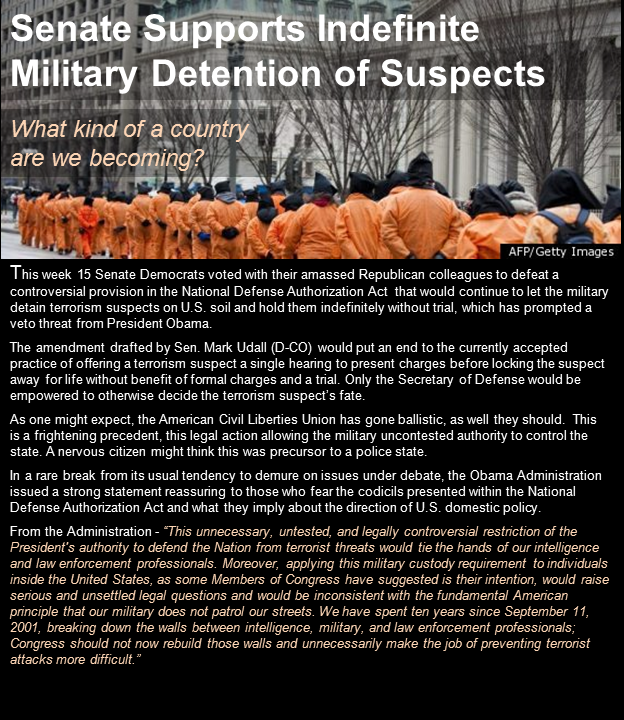 
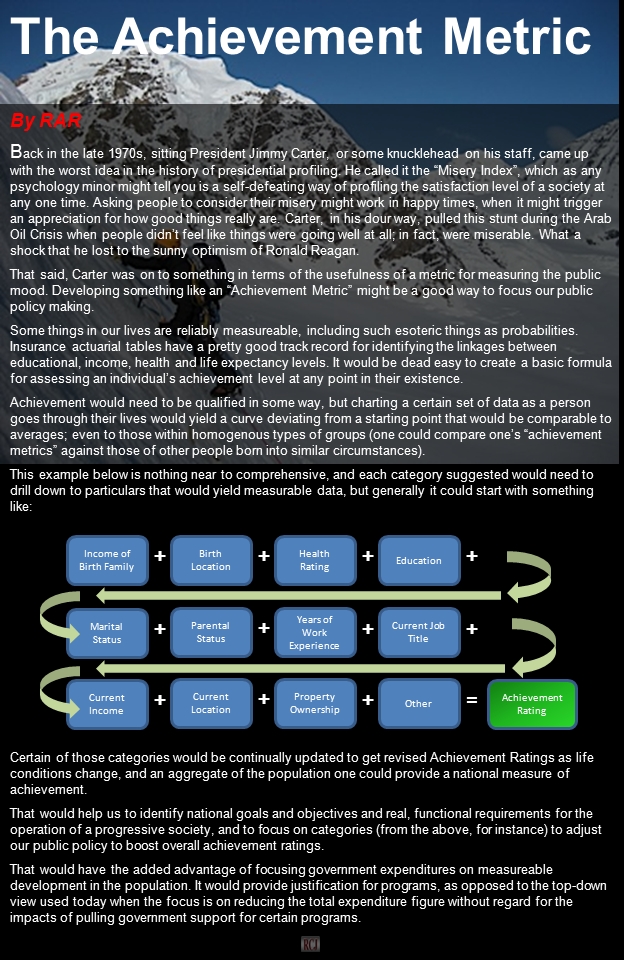




 |
 RARWRITER PUBLISHING GROUP PRESENTS
RARWRITER PUBLISHING GROUP PRESENTS

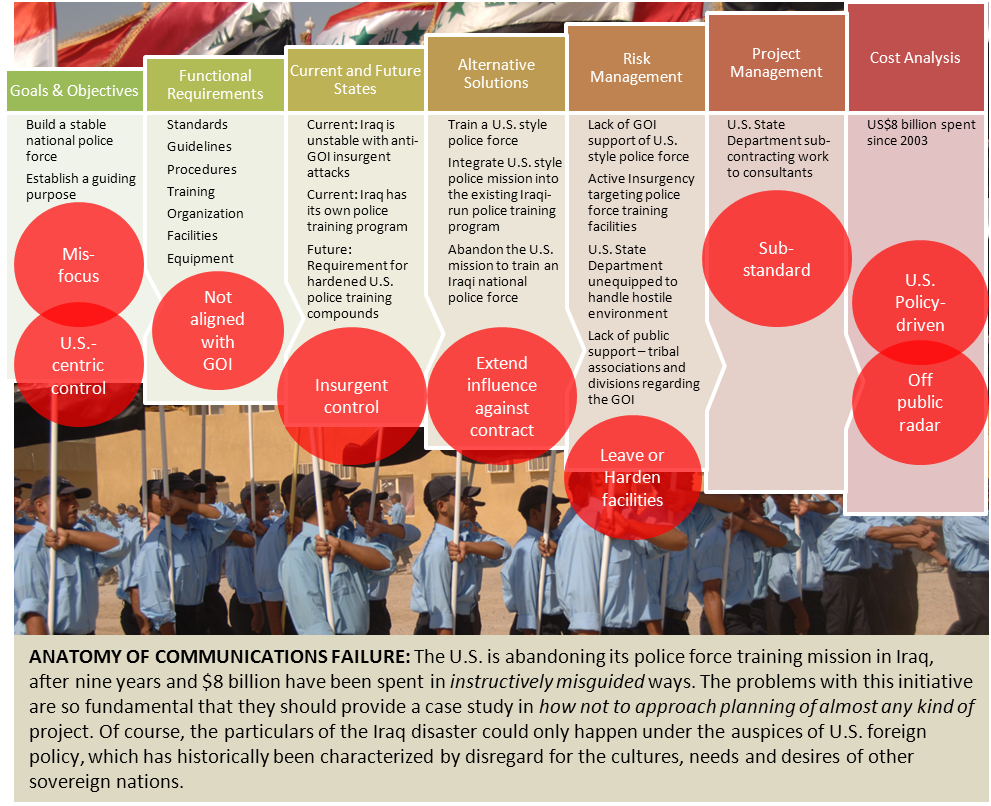
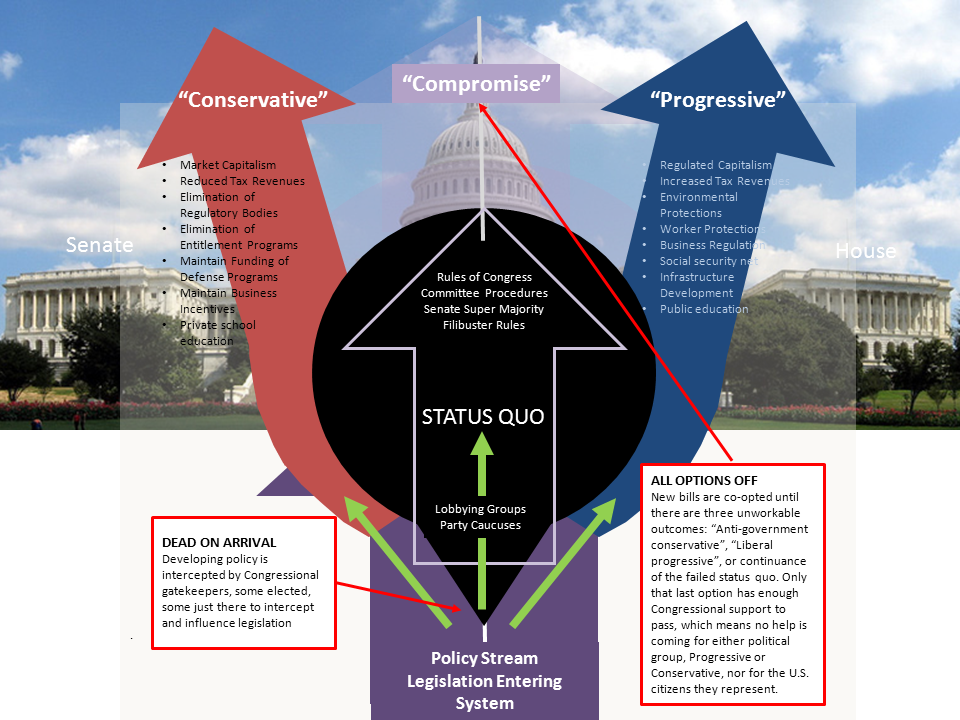




.png)











